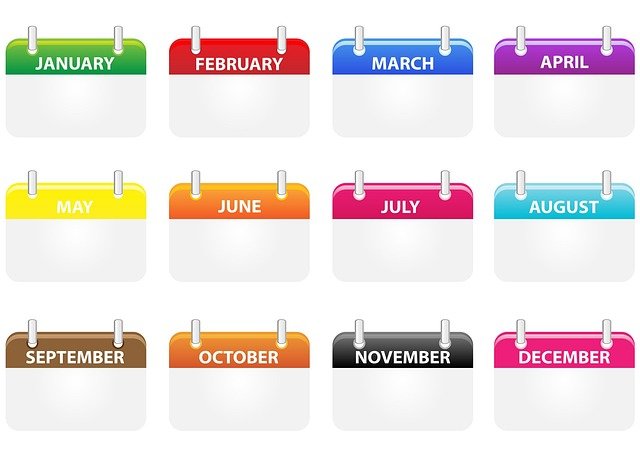Worried that you may be making some critical blogging mistakes on your blog and as a result, your blog is suffering?
Not entirely sure what those blogging mistakes maybe?
Inexperienced bloggers are prone to making mistakes in their early days.
This is only natural.
Like anything you undertake in life, you need to learn it.
Some things you will do well, and other things you could certainly have done better.
In the blogging world 99% of blogs fails and only 1% see the success.
But it’s not impossible – if you follow the certain rules and follow the guidelines the right way then you can achieve your blogging goals.
1. Failing To Have a Schedule
If you want your blog to be around for the long haul then you MUST have a blogging schedule.

Blog when “you feel like it” or “when you have time” will just not cut it.
Sorry to be blunt here!
There will always be temptations to interfere with your ‘whenever schedule’.
Dinner with friends, going to the gym, watching that favorite tv show!
Whatever it is, it is all going to hurt your blog!
For those of you in a 9-5 job, do you decide not to go sometimes because you just don’t feel like it?
Of course, you don’t! You have a commitment to be at your workplace and come rain or shine that is where you must be.
This is also true for your blogging.
Whether you choose to post daily, every other day, weekly, fortnightly or whatever, you need to decide on this and stick with it!
Consistency is what is going to separate you from others, not a ‘whatever’ attitude.
If you decide to post x times a week/month, then that should be your priority.
Make it happen and don’t let this be one of your blogging mistakes!
Goal Setting
Having a schedule for blogging enables you to set clear goals and track your progress.

By establishing realistic deadlines for completing blog posts, you can hold yourself accountable and ensure that you’re consistently working towards achieving your blogging objectives.
Focus
A blogging schedule helps you manage your time more efficiently.
By allocating specific time slots for writing, editing, and promoting your blog posts, you can avoid procrastination and stay focused on the task at hand.
This allows you to make the most of your available time and ensures that you consistently produce high-quality content.
2. Failing in To Provide Valuable Content
This is one of those blogging mistakes that you really shouldn’t ever do! Each post you write should be of VALUE.

Every single post that you write will add to your reputation as a blogger and to the value of your blog.
If the blog is filled with lots of information that is not going to benefit anyone, what will your readers think?
Are they likely to stay and read more or do you think they might look to another blog where they do feel fulfilled?
Regardless of your niche, you can still provide valuable content.
Don’t make the mistake of saying “my blog is about family life” or “my blog is about looking after dogs”, so what could I possibly have of value?
Blog posts don’t need to be written in a teaching style in order to be of value to a reader.
You have chosen your niche, now fill your blog with valuable content relating to that niche.
Ok, so you are a mummy blogger who writes about your family.
I can hear you saying now…” but I just talk about what I’m doing every day, how can that be of value”?
To start with, it may be time to solidify your niche slightly! A broad blog may be fun for you to write, but what benefit will it give your readers?
What is it about being a mummy that you want to write about?
Is it the demands of working and being a mum?
Is it the demands of looking after a toddler and their tantrums?
Are the challenges of raising teenagers?
Can you see how even your ‘mummy blog’ has a niche?
Each of the areas here has questions attached to them, and those questions can be answered in your blog posts.
The answers to those questions are the VALUE that you are giving your reader.
Does this make sense now?
In answering those questions, try and include some links to related and useful sources.
This will not only help your SEO but will also identify you as someone that knows what you are talking about!
For example, if you are writing a post about managing your teenager, why not tap into some resources that you have found useful.
You are instantly then providing value to your reader.
Think about your posts as answering a specific problem.
What is it that you are going to write about today that someone else is searching for on Google?
Content Quality Mistakes
Lack of Research
One of the biggest mistakes bloggers make is not conducting thorough research before writing their content.
Research helps you gather accurate information, identify knowledge gaps, and provide unique insights to your readers.
To rectify this, spend time researching your topic, use reliable sources, and cite your references to add credibility to your content.
Lack of Originality
Creating original content is essential to stand out in a crowded blogosphere.
Avoid the mistake of regurgitating information that is readily available elsewhere.
Instead, provide a unique perspective, share personal experiences, or offer fresh insights.
This will make your content more valuable and appealing to your readers.
Inconsistent Posting
Consistency is key when it comes to blogging.
Irregular posting schedules can lead to a loss of readership and engagement.
Create an editorial calendar and stick to a consistent posting schedule.
This will help you build trust with your audience and keep them coming back for more.
3. Failing To Place Importance on SEO Or Keywords
If you are aiming for your blog to rank highly in the search engines, you simply can not ignore SEO.
Regardless of your niche, ignoring SEO will doom your blog and is one of the classic blogging mistakes!
You MUST optimize each and every blog post you write and make sure you spend the time doing this.
As you gain experience with this, you will notice an improvement in how your posts are ranking.
EVERY post you schedule MUST have a keyword!!
Many newbie bloggers fail to consider this and say “I’m working on my writing rather than driving traffic”.
But ask yourself this….why bother writing if you are failing to get any traffic?
Who are you writing for? Yourself????
Each post you write will help with your overall strategy, so start it right from the start.
Don’t waste those precious blog posts!!
How to Rectify ” Keywords Mistake”
While it’s important to target popular keywords, don’t forget about long-tail keywords.
These are longer, more specific keyword phrases that typically have lower search volume but higher conversion rates.
Incorporate long-tail keywords into your content to capture targeted traffic and attract readers who are closer to making a purchase decision.
Analyze Competitors
Another effective way to find relevant keywords is by analyzing your competitors’ blogs.
Look at the keywords they are targeting and the topics they are covering.
This can give you valuable insights into what is working in your niche and help you identify any gaps in your own content strategy.
Use Keyword Research Tools
There are several keyword research tools available that can help you identify the most popular and relevant keywords in your niche.
Tools like Google Keyword Planner, SEMrush, and Ahrefs provide valuable insights into search volume, competition, and related keywords.
Utilize these tools to find keywords that have a good balance of search volume and competition.
4. Ignoring Your Readers
Every time that someone leaves a comment either on your blog or one of your social media sites, make sure that you take the time to respond to them!
When you respond to your comments, think about how you can continue to engage with not only that reader, but also others that will be reading the comment section.
It is lovely to say “thanks for your comment”, but it is unlikely to gain any further engagement from your readers.
Try and expand on something that your reader has commented about, or answer their question if one has been asked.
You can still thank the commenter afterward, but it is good to encourage more engagement where possible.
You don’t want your readers to feel like you are ignoring them, so don’t let this be one of your blogging mistakes!
Having a comment section on your blog will allow you to identify with where your readers are at.
Take a look at the posts that are receiving a higher number of comments.
There is something about those posts that readers are happy to engage with you about.
Maybe write more of that subject!
Think about how you action your comment tab.
Some blogs have it set so that you need to be registered to the blog to leave a comment.
This can leave a lot of people running for the hills, so you might want to avoid this!
You may have seen that some blogs require you to tick a box to confirm you are not a spammer or enter a captcha.
I personally find it very irritating when I have spent the time writing a comment, only to then have to enter one and sometimes two captchas for my comment to proceed.
Think about whether this will put off your readers from wanting to bother to comment!
How it Kills Blog
Lack of Engagement: Ignoring readers can lead to a lack of comments, shares, and overall engagement on your blog.
This can make your content appear less credible and relevant, ultimately diminishing its impact.
High Bounce Rates: If readers feel that your content does not resonate with them or address their needs, they are more likely to leave your blog without exploring further.
High bounce rates can negatively impact your website’s SEO and visibility.
Missed Opportunities: By not engaging with your readers, you miss out on valuable insights, suggestions, and collaborations.
These missed opportunities can hinder your blog’s growth and limit its potential for success.
5. Choosing Blog Titles Too Hastily
This is one of those blogging mistakes that are all too often overlooked.
Despite the fact that your blog title is very small compared to the rest of your post, don’t underestimate its importance!
Your title could make the difference between someone deciding to continue reading or not.
The blog titles you choose will also carry SEO weight, so it is important to try and include a relevant keyword in all your blog titles.
It must look natural of course, so spend some time thinking about your title and don’t just write the first thing that pops into your head!
Failing to Address the Reader’s Pain Points
Understanding your target audience and addressing their pain points is crucial for creating compelling headlines.
Your headlines should clearly communicate how your blog post will solve a problem or provide valuable information to your readers.
By addressing their pain points directly, you can establish trust and credibility, increasing the likelihood of readers clicking on your blog post.
Lack of Emotional Appeal
Emotional appeal plays a significant role in capturing readers’ attention and enticing them to click on your blog post.
Incorporate emotional triggers into your headlines to evoke curiosity, excitement, or a sense of urgency.
For example, using words like “ultimate,” “essential,” or “life-changing” can create a strong emotional response and make your headlines more compelling.
6. Don’t Write For Robots!
Of course, we all want our blogs to be indexed by Google.
We wouldn’t be blogging if we didn’t want people to find us.
But have a think about whether you are writing purely for SEO or for your readers?
Writing for robots is one of the big blogging mistakes.
SEO is important for the search engines to find you, but ultimately it is PEOPLE who are reading your blog.
The content on your blog needs to be readable, and not keyword-stuffed.
I have said it before, but write for your readers first and then go back and optimize your page.
This will ensure that your readers are remaining your priority.
Whilst we have looked at six blogging mistakes, there is no need to panic because they can be easily fixed!
Each and every mistake that you rectify can boost your readership and ultimately the longevity of your blog.
What blogging mistakes were you encountering when you first started your blog?
Were you guilty of any of the above? Please share your thoughts with us below.
How to Rectify
Write Naturally
One of the most crucial aspects of writing for humans is to use a natural, conversational tone.
Avoid stuffing your blog posts with keywords or phrases that make the content sound robotic or forced.
Instead, focus on creating content that flows smoothly and engages the reader. Remember, your goal is to connect with your audience, not just to rank higher in search engine results.
Incorporate Visuals
Humans are visual creatures, so it’s important to include images, infographics, videos, or other visual elements in your blog posts.
Visuals not only make your content more appealing but also help to break up the text and reinforce your message.
Be sure to optimize your visuals for SEO by using descriptive alt tags and relevant filenames.




